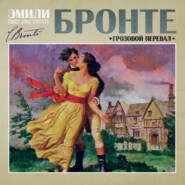По всем вопросам обращайтесь на: info@litportal.ru
(©) 2003-2025.
✖
Грозовой перевал / Wuthering Heights
Настройки чтения
Размер шрифта
Высота строк
Поля
I went into the kitchen, and sat down to lull my little lamb to sleep. Heathcliff, as I thought, walked through to the barn. It turned out afterwards that he only got as far as the other side the settle, when he flung himself on a bench by the wall, removed from the fire and remained silent.
I was rocking Hareton on my knee, and humming a song that began, —
It was far in the night, and the bairnies grat,
The mither beneath the mools heard that,[31 - Цитата из поэмы Вальтера Скотта «Дева Озера» по мотивам шотландских баллад. Это история о возмездии с элементами волшебства.]
when Miss Cathy, who had listened to the hubbub from her room, put her head in, and whispered, ‘Are you alone, Nelly?’
‘Yes, Miss,’ I replied.
She entered and approached the hearth. I, supposing she was going to say something, looked up. The expression of her face seemed disturbed and anxious. Her lips were half asunder, as if she meant to speak, and she drew a breath; but it escaped in a sigh instead of a sentence. I resumed my song; not having forgotten her recent behaviour.
‘Where’s Heathcliff?’ she said, interrupting me.
‘About his work in the stable,’ was my answer.
He did not contradict me; perhaps he had fallen into a doze. There followed another long pause, during which I perceived a drop or two trickle from Catherine’s cheek to the flags. Is she sorry for her shameful conduct? I asked myself. That will be a novelty: but she may come to the point as she will I sha’n’t help her! No, she felt small trouble regarding any subject, save her own concerns.
‘Oh, dear!’ she cried at last. ‘I’m very unhappy!’
‘A pity,’ observed I. ‘You’re hard to please; so many friends and so few cares, and can’t make yourself content!’
‘Nelly, will you keep a secret for me?’ she pursued, kneeling down by me, and lifting her winsome eyes to my face with that sort of look which turns off bad temper, even when one has all the right in the world to indulge it.
‘Is it worth keeping?’ I inquired, less sulkily.
‘Yes, and it worries me, and I must let it out! I want to know what I should do. To-day, Edgar Linton has asked me to marry him, and I’ve given him an answer. Now, before I tell you whether it was a consent or denial, you tell me which it ought to have been.’
‘Really, Miss Catherine, how can I know?’ I replied. ‘To be sure, considering the exhibition you performed in his presence this afternoon, I might say it would be wise to refuse him: since he asked you after that, he must either be hopelessly stupid or a venturesome fool.’
‘If you talk so, I won’t tell you any more,’ she returned, peevishly rising to her feet. ‘I accepted him, Nelly. Be quick, and say whether I was wrong!’
‘You accepted him! Then what good is it discussing the matter? You have pledged your word, and cannot retract.’
‘But say whether I should have done so, do!’ she exclaimed in an irritated tone; chafing her hands together, and frowning.
‘There are many things to be considered before that question can be answered properly,’ I said, sententiously. ‘First and foremost, do you love Mr. Edgar?’
‘Who can help it? Of course I do,’ she answered.
Then I put her through the following catechism: for a girl of twenty-two it was not injudicious.
‘Why do you love him, Miss Cathy?’
‘Nonsense, I do, that’s sufficient.’
‘By no means; you must say why?’
‘Well, because he is handsome, and pleasant to be with.’
‘Bad!’ was my commentary.
‘And because he is young and cheerful.’
‘Bad, still.’
‘And because he loves me.’
‘Indifferent, coming there.’
‘And he will be rich, and I shall like to be the greatest woman of the neighbourhood, and I shall be proud of having such a husband.’
‘Worst of all. And now, say how you love him?’
‘As everybody loves. You’re silly, Nelly.’
‘Not at all. Answer.’
‘I love the ground under his feet, and the air over his head, and everything he touches, and every word he says. I love all his looks, and all his actions, and him entirely and altogether. There now!’
‘And why?’
‘Nay; you are making a jest of it: it is exceedingly ill-natured! It’s no jest to me!’ said the young lady, scowling, and turning her face to the fire.
‘I’m very far from jesting, Miss Catherine,’ I replied. ‘You love Mr. Edgar because he is handsome, and young, and cheerful, and rich, and loves you. The last, however, goes for nothing: you would love him without that, probably; and with it you wouldn’t, unless he possessed the four former attractions.’
‘No, to be sure not: I should only pity him – hate him, perhaps, if he were ugly, and a clown.’
‘But there are several other handsome, rich young men in the world: handsomer, possibly, and richer than he is. What should hinder you from loving them?’
‘If there be any, they are out of my way: I’ve seen none like Edgar.’
‘You may see some; and he won’t always be handsome, and young, and may not always be rich.’
‘He is now; and I have only to do with the present. I wish you would speak rationally.’
‘Well, that settles it: if you have only to do with the present, marry Mr. Linton.’
‘I don’t want your permission for that. I SHALL marry him: and yet you have not told me whether I’m right.’
‘Perfectly right; if people be right to marry only for the present. And now, let us hear what you are unhappy about. Your brother will be pleased; the old lady and gentleman will not object, I think; you will escape from a disorderly, comfortless home into a wealthy, respectable one; and you love Edgar, and Edgar loves you. All seems smooth and easy: where is the obstacle?’
‘HERE! and HERE!’ replied Catherine, striking one hand on her forehead, and the other on her breast: ‘in whichever place the soul lives. In my soul and in my heart, I’m convinced I’m wrong!’
‘That’s very strange! I cannot make it out.’
‘It’s my secret. But if you will not mock at me, I’ll explain it: I can’t do it distinctly; but I’ll give you a feeling of how I feel.’
She seated herself by me again: her countenance grew sadder and graver, and her clasped hands trembled.
I was rocking Hareton on my knee, and humming a song that began, —
It was far in the night, and the bairnies grat,
The mither beneath the mools heard that,[31 - Цитата из поэмы Вальтера Скотта «Дева Озера» по мотивам шотландских баллад. Это история о возмездии с элементами волшебства.]
when Miss Cathy, who had listened to the hubbub from her room, put her head in, and whispered, ‘Are you alone, Nelly?’
‘Yes, Miss,’ I replied.
She entered and approached the hearth. I, supposing she was going to say something, looked up. The expression of her face seemed disturbed and anxious. Her lips were half asunder, as if she meant to speak, and she drew a breath; but it escaped in a sigh instead of a sentence. I resumed my song; not having forgotten her recent behaviour.
‘Where’s Heathcliff?’ she said, interrupting me.
‘About his work in the stable,’ was my answer.
He did not contradict me; perhaps he had fallen into a doze. There followed another long pause, during which I perceived a drop or two trickle from Catherine’s cheek to the flags. Is she sorry for her shameful conduct? I asked myself. That will be a novelty: but she may come to the point as she will I sha’n’t help her! No, she felt small trouble regarding any subject, save her own concerns.
‘Oh, dear!’ she cried at last. ‘I’m very unhappy!’
‘A pity,’ observed I. ‘You’re hard to please; so many friends and so few cares, and can’t make yourself content!’
‘Nelly, will you keep a secret for me?’ she pursued, kneeling down by me, and lifting her winsome eyes to my face with that sort of look which turns off bad temper, even when one has all the right in the world to indulge it.
‘Is it worth keeping?’ I inquired, less sulkily.
‘Yes, and it worries me, and I must let it out! I want to know what I should do. To-day, Edgar Linton has asked me to marry him, and I’ve given him an answer. Now, before I tell you whether it was a consent or denial, you tell me which it ought to have been.’
‘Really, Miss Catherine, how can I know?’ I replied. ‘To be sure, considering the exhibition you performed in his presence this afternoon, I might say it would be wise to refuse him: since he asked you after that, he must either be hopelessly stupid or a venturesome fool.’
‘If you talk so, I won’t tell you any more,’ she returned, peevishly rising to her feet. ‘I accepted him, Nelly. Be quick, and say whether I was wrong!’
‘You accepted him! Then what good is it discussing the matter? You have pledged your word, and cannot retract.’
‘But say whether I should have done so, do!’ she exclaimed in an irritated tone; chafing her hands together, and frowning.
‘There are many things to be considered before that question can be answered properly,’ I said, sententiously. ‘First and foremost, do you love Mr. Edgar?’
‘Who can help it? Of course I do,’ she answered.
Then I put her through the following catechism: for a girl of twenty-two it was not injudicious.
‘Why do you love him, Miss Cathy?’
‘Nonsense, I do, that’s sufficient.’
‘By no means; you must say why?’
‘Well, because he is handsome, and pleasant to be with.’
‘Bad!’ was my commentary.
‘And because he is young and cheerful.’
‘Bad, still.’
‘And because he loves me.’
‘Indifferent, coming there.’
‘And he will be rich, and I shall like to be the greatest woman of the neighbourhood, and I shall be proud of having such a husband.’
‘Worst of all. And now, say how you love him?’
‘As everybody loves. You’re silly, Nelly.’
‘Not at all. Answer.’
‘I love the ground under his feet, and the air over his head, and everything he touches, and every word he says. I love all his looks, and all his actions, and him entirely and altogether. There now!’
‘And why?’
‘Nay; you are making a jest of it: it is exceedingly ill-natured! It’s no jest to me!’ said the young lady, scowling, and turning her face to the fire.
‘I’m very far from jesting, Miss Catherine,’ I replied. ‘You love Mr. Edgar because he is handsome, and young, and cheerful, and rich, and loves you. The last, however, goes for nothing: you would love him without that, probably; and with it you wouldn’t, unless he possessed the four former attractions.’
‘No, to be sure not: I should only pity him – hate him, perhaps, if he were ugly, and a clown.’
‘But there are several other handsome, rich young men in the world: handsomer, possibly, and richer than he is. What should hinder you from loving them?’
‘If there be any, they are out of my way: I’ve seen none like Edgar.’
‘You may see some; and he won’t always be handsome, and young, and may not always be rich.’
‘He is now; and I have only to do with the present. I wish you would speak rationally.’
‘Well, that settles it: if you have only to do with the present, marry Mr. Linton.’
‘I don’t want your permission for that. I SHALL marry him: and yet you have not told me whether I’m right.’
‘Perfectly right; if people be right to marry only for the present. And now, let us hear what you are unhappy about. Your brother will be pleased; the old lady and gentleman will not object, I think; you will escape from a disorderly, comfortless home into a wealthy, respectable one; and you love Edgar, and Edgar loves you. All seems smooth and easy: where is the obstacle?’
‘HERE! and HERE!’ replied Catherine, striking one hand on her forehead, and the other on her breast: ‘in whichever place the soul lives. In my soul and in my heart, I’m convinced I’m wrong!’
‘That’s very strange! I cannot make it out.’
‘It’s my secret. But if you will not mock at me, I’ll explain it: I can’t do it distinctly; but I’ll give you a feeling of how I feel.’
She seated herself by me again: her countenance grew sadder and graver, and her clasped hands trembled.

















